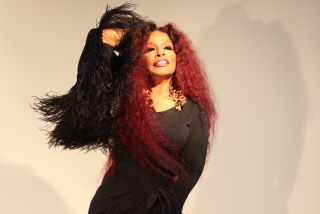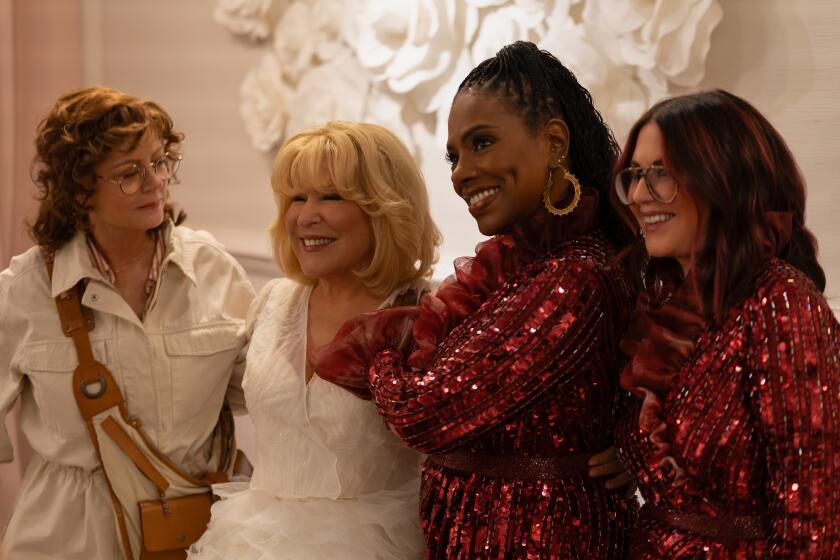COLUMN ONE : CNN: The Channel to the World : The Gulf War certifies it’s the first true international news network. Critics worry about its instant reporting, but global leaders have made it a new diplomatic conduit.
A few days after the United States made its only offer for direct talks with Iraq last November, the Emir of Bahrain met President Bush in a private Oval Office session and offered at least a partial explanation for why the offer was stalemated: Cable News Network.
“CNN is operating against us,” the emir said of the Atlanta-based news organization, one senior Administration official present recalls.
Saddam Hussein watches the debate over gulf policy in America on CNN, the emir said, but he doesn’t understand it--he thinks the United States will not do anything and that the President is paralyzed.
While the emir’s concern did not fully convince the Administration, it did highlight what the parade of live Saudi Arabian air raid alerts, Patriot missile intercepts and Iraqi communiques has made dizzyingly plain: The Persian Gulf War has certified CNN’s unique role as the first true international news network, with all the advantages and drawbacks that implies.
It has become a new channel for world diplomacy, often supplanting the diplomatic cable and the ambassadorial meeting. It has unique influence on international stories, despite the limitation of being aired live in the United States only on cable systems. As the only Western TV network seen in Baghdad, for instance, CNN correspondent Peter Arnett was invited to remain in Iraq, while other news organizations were thrown out.
When cable entrepreneur Ted Turner founded CNN 11 years ago, he dreamed of an international news organization that would bring the world closer together--and closer to peace.
But the implications of Turner’s dream may be more complicated than he imagined. Some government officials--the royal family in Bahrain is not alone--worry about the abbreviated rhetoric of TV supplanting the precise language and personal contact of diplomacy. CNN has given a diplomatic channel to countries that might otherwise not have been heard, from Libya’s Moammar Kadafi to Saddam Hussein. Others note that much of the time, what CNN provides is raw information--sometimes unconfirmed, unnarrated, unedited and uninterpreted--and, it passes so quickly, its meaning is often elusive or simply trivial.
Acknowledges Turner: “Everything is speeded up to the point where people can’t deal with it.”
Has Few Worries
But he seems to harbor few worries about the effect on diplomacy and world events.
“I think . . . it is more advantageous to have as much information as possible,” he argues. And in any case, “you can’t go back and put the cork in the bottle.”
President Bush even concluded that war was finally inevitable from watching CNN, Administration officials have said. That moment came during Iraqi Foreign Minister Tariq Aziz’s globally televised press conference on CNN in Geneva after the meeting Jan. 12 with Secretary of State James A. Baker III. Aziz was rallying Arab support for war, the President told aides later, not offering a moderating view for peace.
So crucial was CNN’s international audience to Aziz, the Iraqi foreign minister checked with network officials to make sure he wouldn’t be preempted by an upcoming Bush press conference. To be on CNN at such moments of high international drama literally means being seen in government ministries around the world. The network is broadcast in more than 100 countries, and with satellite receivers increasingly less expensive, it is picked up in ministries in many more countries than that.
When CNN called the Palestine Liberation Organization in Tunis on the first night of war to ask if its leader Yasser Arafat would appear on camera, Arafat’s aide responded: “The President is in the situation room watching CNN and cannot be disturbed.”
Two days later, the aide was calling CNN’s foreign desk complaining that CNN was putting on too many Israeli officials and demanding equal time.
CNN’s real coming of age may have occurred the first night of this war, when it alone among news organizations had an open phone line from Baghdad to the West, over which its correspondents narrated the initial 16 hours of allied bombing.
CNN’s prime time viewership exploded that evening from its normal 560,000 to an astonishing 11.4 million. That was more than even the networks reached in cable markets.
Even those numbers may not tell the full story. CNN was also carried on more than 40 stations overseas in at least 25 countries. It was also carried on dozens of independent U.S. and network affiliated locals--in some cases breaking away from network coverage.
If Vietnam was the first television war, this so far has been the first 24-hour news war, with each air raid signal broadcast live.
It is a long way for the network founded in June, 1980, by the Atlanta cable pioneer once derisively referred to as “The Mouth of the South.” CNN lost $200 million in its first five years, and it had to sue to get equal treatment with the networks in the White House press room. But it eventually turned a profit in 1985, and today it is the most profitable part of the Turner Broadcasting empire, earning a pretax operating profit of $134 million in 1989 on revenues of $341 million, at a time when some of the network news divisions are struggling to stay in the black.
At different times, there have even been reported inquiries from the networks interested in buying it, though Turner has always insisted that CNN is not for sale.
But the turning point in CNN’s influence came when the network started making its signal available to broadcasters overseas in the mid-1980s.
Lacking many foreign bureaus of its own, the fledgling network originally started sending its signal overseas so that in exchange it could get video footage from overseas broadcasters, said Ed Turner, CNN’s executive vice president for news, no relation to the network’s founder.
In addition, CNN saw a market providing news to American travelers and expatriates.
Links to World’s Elite
But the significance of linking international broadcasting systems soon became obvious. Most of the world’s broadcasting systems are government owned. By granting signals to other broadcasters, CNN was really speaking directly to the world’s political elite.
Ed Turner recalls the first time this translated into CNN’s role as a diplomatic conduit was with the fall of Philippines President Ferdinand E. Marcos in 1986. As things disintegrated, Turner recalls, a Marcos press aide called CNN’s Tokyo bureau, asking if CNN would broadcast a speech Marcos wanted to deliver to the United States, particularly to Congress.
“He sensed he was losing (the support of) the White House,” Ed Turner recalled, “and he wanted to talk to a handful of lawmakers on Capitol Hill to shore up his support in Congress.”
A few months later, shortly before the United States bombed Libya, Kadafi held a press conference for the Western press in Libya. While other news organizations had to guess about the day, Kadafi’s staff told CNN exactly when it would be held. Kadafi also insisted that CNN ask him a question during the press conference. The network arranged a hookup with Washington correspondent Daniel Schorr, then probably its best known reporter.
Today, such examples of personal contact with world leaders are commonplace. Loyal viewers include not only Arafat and Hussein, but Soviet President Mikhail S. Gorbachev, French President Francois Mitterrand and Saudi Arabia’s King Fahd. Cuban President Fidel Castro is a fan, too, though he told Ted Turner that he steals the signal without paying for it.
One of the concessions that the Polish government made in the mid-1980s, when it was trying to mollify the Solidarity union, was to include a half hour of CNN on its nightly government newscast.
When U.S. troops invaded Panama, the Soviet Ministry did not send a formal protest through diplomatic channels. Instead, it called CNN so that a Soviet official could broadcast a statement condemning the invasion.
What may be less clear are the implications. Is a televised condemnation more serious than a written protest delivered to the State Department? Or is it less?
The concerns of the Emir of Bahrain about how Saddam Hussein interprets the messages is not the only example of leaders wondering about CNN’s impact on diplomacy. Privately, State Department officials working with the Kuwaiti government in exile have described spending hours acting as cultural translators for anxious Kuwaiti royalty who watch CNN.
“You are talking to several different levels now simultaneously,” said journalist Hodding Carter, who also served as State Department spokesman for the Jimmy Carter Administration. “But diplomats were absolutely appalled with the advent of the telegraph, too, that regular people were getting information as fast as they were.”
In effect, CNN may be helping to democratize the diplomatic process. When the United States invaded Panama, CNN put up a phone number on the screen, and much of what the world learned about events on the ground came from a steady stream of Panamanians calling the network as eye witnesses.
Diplomacy now can more easily involve talking over the heads of government officials and appealing directly to public opinion. Saddam Hussein on Sunday sent his radio address over CNN calling for Arabs worldwide to engage in a holy war.
CNN has come under attack from other networks for being used by the enemies of America. The latest charge came Monday in a Washington Post story that wondered whether Peter Arnett, the CNN reporter still in Baghdad, was functioning as a tool of Iraq.
CNN officials counter that journalists are used all the time. “We air briefings by George Bush live,” says Turner, the network’s founder.
“The briefings and speeches of George Bush we shoot with our own cameraman, our own people,” counters Steve Friedman, executive producer of NBC Nightly News. “What they are doing is like taking a video from the White House press office and airing it live.”
The argument, at base, gets to the very idea of an international network. Can everyone in the world understand the same news broadcast? Or is communication something that differs culture by culture?
CNN President Tom Johnson says he is determined to make CNN more culturally diverse in its staffing. CNN also has the International Hour, in which broadcasters from all countries air reports, unedited by CNN, about their home countries.
“Truth depends on what your viewpoint is,” Ted Turner said. “We try to deliver the news so that people can draw their own conclusions.”
This neutrality is true, Ted Turner believes, even in wartime, which he concedes “has put us in a bit of a difficult position. We would like to be as impartial as we can be, even now.”
One reflection of that is the role of the anchors at CNN.
“Our stars are the reporters,” Ed Turner said. “Even Bernie (Shaw) is best known for his work here as a reporter.”
The real stars of the network may be the technical people, including Richard Tauber, CNN’s vice president for Satellites and Circuits, who had arranged for the phone line into Baghdad that never went down, and CNN foreign editor Eason Jordon, who originated the idea.
These are the people who make it possible to broadcast instantly from almost anywhere in the world.
As a result, “it does seem as though there is a slightly greater tendency to run with the story before it is confirmed,” said Michael Robinson, a professor of government at Georgetown University.
Unconfirmed Reports
CNN and ABC both aired unconfirmed reports last week of Israeli retaliation against Iraq, for instance, which had to be retracted. CNN also, on the first night, was quick to report that the Iraqi Air Force and elite Republican Guard were virtually destroyed, drawing criticism from Secretary of Defense Dick Cheney.
“One definition of professionalism is imposing an edited perspective on raw material and CNN often does not do that,” said former State Department spokesman Carter. “Being the open conduit, it necessarily is filling the void with whatever is at hand, which means a lot of blather or a lot of erroneous material.”
On Friday, for instance, when air raid sirens sounded in Israel, the hotel housing the international press in Saudi Arabia sounded its alert, too, and CNN instantly reported that “sirens are being heard in Dhahran, Saudi Arabia.”
But as became clear less than a minute later, the alert was not official. It was only the hotel alarm system, and CNN had to correct itself.
Even CNN’s Jordon mused that perhaps the Saudi hotel management had seen the Israeli sirens over CNN and, as a precaution, turned its own on. “Hell,” he said, “I would.”
More to Read
The biggest entertainment stories
Get our big stories about Hollywood, film, television, music, arts, culture and more right in your inbox as soon as they publish.
You may occasionally receive promotional content from the Los Angeles Times.






